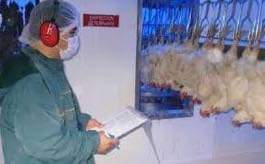by-DR. RAJESH KUMAR SINGH, (LIVESTOCK & POULTRY CONSULTANT), JAMSHEDPUR, JHARKHAND,INDIA 9431309542, rajeshsinghvet@gmail.com
The product temperature shall be maintained at or below minus 18 degree Celsius for frozen & at or below 4 degree Celsius for chilled products in any part of the cold chain, during storage, transport, distribution, and merchandising in retail stores.
Loading and dispatch of finished products ————-
Dispatch vehicle shall be checked for presence of any contaminants, cleanliness,
unacceptable odour and proper working of refrigeration system before loading. Loading
should be done in shortest possible time. Dispatch vehicles shall be cleaned and sanitized
using appropriate cleaning and sanitizing agents regularly to maintain the hygiene standard.
Warehousing ———————–
Stacking methods and height depend on several factors: resistance of the package, handling techniques and thermal state. Packaged and frozen meat is usually handled mechanically, combining forklift trucks with pallet.
Storage temperature of warehousing should be at or below minus 18 Degrees Celsius except during defrosting cycle in case of frozen product and at or below 4 degree Celsius in case of chilled product.
Transportation ———————–
All the transportation systems are expected to maintain the temperature of the processed meat and meat products within close limits to ensure its optimum safety and recommended shelf life. It is important that the processed meat and meat products is at the correct
temperature before loading since the refrigeration systems used in most transport
containers are not designed to extract heat from the product but to maintain the
temperature of the product. In large containers used for long distance transportation, food temperature can be kept within recommended frozen temperature (at or below minus 18 degrees Celsius for frozen and at or below 4 degree Celsius for chilled products). Ensure proper air circulation is available to maintain product temperature during transportation.
Different modes of transportation: —————-
a) Air- freight: This is used for highly perishable frozen food products. Although this provides a rapid method of serving distant markets, the main challenge faced is the product is mainly
unprotected by refrigeration for much of its journey; due to the intermittent holding time. Standard containers with insulated linings and /or dry ice shall be used.
b) Road/ Rail: Refrigerated containers (for long distance) and Small Insulated / Refrigerated /
Eutectic vans (for short distance) are used to supply food to local retail outlets or directly to the consumers. All vehicles shall have the temperature monitoring device.
Retail and display ————–
During display; the temperature, temperature fluctuations and visual monitoring (like color of product, packaging intact, etc.) are the main parameters that determine the quality. Ensure that products are stored in clean display cases which are covered at all times. See-through insulated lids are for consumer to look at the product at retail shops. Ensure products are stored at appropriate temperatures. Temperature differential or range should be kept at minimum. Adopt first-in-first-out (FIFO) method in the display of products for sale. Proper declaration on the products is needed & it should comply with requirements of FSSRs. (Packaging & Labelling).All containers should be cleaned and disinfected daily.
Reference:On request


